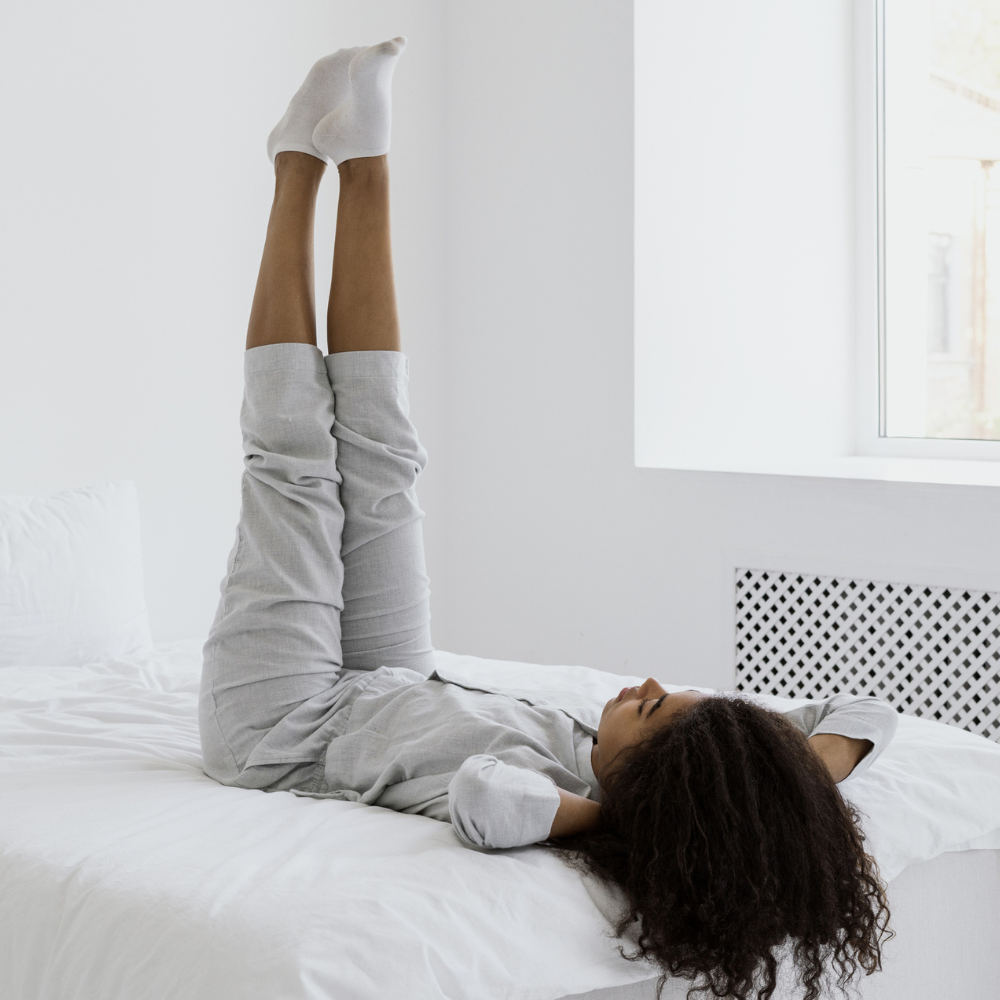Bed Rotting: What Is The Crazy Gen Z Self-Care Trend About?

A creative writer with a voracious appetite for fashion, beauty,…
T
here are days we want to unapologetically pull a Bruno Mars Lazy Day. It’s often because our bodies are starting to revolt against stress or our minds have finally reached shutdown mode. Whatever the case, laying in bed all day doing nothing but flipping through your favorite shows and snoring away can be dang relaxing. But can it be overdone?
Apparently, this is what Gen Zs called Bed Rotting. (Heck, these days, trends are surplus, and there’s a name for practically everything). As its name implies, bed rotting is the act of rotting away in bed, aka, laying in bed all day, either watching a movie or swiping your phone. I honestly believe the word rotting is harsh, seeing all I ever wanted to do was lay down and do nothing while I recuperate. But is it all bad or does it serve some sort of self-care purpose?
Is this self-care?
@braincraft In defence of #inbedrotting because it’s perfect 🛌💙 #lifehack #bedrot #bedrotting #bed #bedroomtok #sleepscientist #fyp
♬ Coastline – Hollow Coves
Resting isn’t a bad thing. We all need it. And it’s relatable how guilt can creep in when we’re trying to relax and indulge in some “bed rotting” time. However, as much as it might feel great to laze around all day, there are indeed some disadvantages of spending extended periods in bed, especially if it becomes a regular habit or merely a trendy thing. (And please, can we call it duvet downtime instead?)
The arguments surrounding bed rotting are fierce and contradictory. There are a bunch of individuals who blame capitalism and the entire stress of adulthood for it. These folks aren’t buying people talking down on the trend. And then, there are others who worry that this could lead to deeper mental issues. If bed rotting becomes a lifestyle, it will certainly become borderline toxic. Prolonged immobility has been proven to stir up mental issues like depression and anxiety. This isn’t to encourage sweeping things under the carpet and avoiding your inner thoughts, but it means rotting away in bed for too long could mean you’d literally start rotting away.
Here are some effects of bed rotting to consider before joining the trend
@ericleffler_ Is bed rotting self care ir self abandonment? #lifeadvice #lifecoach #mindset #subconsciousmind #mentalhealth #healingtiktok #dothework #breakthrough #selfcare #selfabandonment #inbedrotting #bedrotting #greenscreen
♬ original sound – Eric | The Breakthrough Coach
Physical health effects: Prolonged bed rest can lead to physical issues like muscle stiffness, joint pain, and even weakened bones. It’s essential to keep our bodies active and moving to maintain good health.
Mental health effects: While taking a break is necessary for self-care, excessive bed rotting can lead to feelings of lethargy and isolation and even contribute to symptoms of depression and anxiety.
Productivity effect: Spending too much time in bed can disrupt your daily routines and hinder productivity in the long run. It’s okay to take a break but it’s crucial to find a balance between relaxation and getting things done.
See some other ways to rest
@doctarz Have you heard of bed rotten? #bedroomcheck #medicine #medicalexpert #medicine #bedrotting
♬ Good Vibes (Instrumental) – Ellen Once Again
There are other ways to unwind, especially if you’re not drawn to the bed-rotting trend but would love to take a much-needed time out. If you don’t want to stay all day in bed, here are other effective methods:
Nature walks: Taking a stroll in nature can be refreshing. It allows you to connect with the environment, breathe fresh air, and clear your mind.
Meditation and yoga: Engaging in mindfulness practices can help calm your thoughts and reduce stress. A short meditation session or some gentle yoga can work wonders.
Reading a book: Getting lost in a good book can be an excellent way to unwind. It engages your mind while providing an escape from daily stresses.
Hobbies and creative outlets: Pursuing hobbies or creative activities you enjoy, such as painting, writing, or cooking, can be both relaxing and fulfilling.
Social interaction: Spending time with friends or family can be rejuvenating. Whether it’s going out for coffee or simply chatting on the phone, connecting with loved ones is essential for our well-being.
Exercise: Engaging in regular physical activity, be it a workout, dancing, or playing sports, can boost your energy levels and mood.
Digital detox: Taking a break from the screens can be incredibly beneficial. Try putting away your phone and other devices for a while to reduce digital fatigue. You’ll be glad you did.
Napping mindfully: Instead of rotting in bed all day, take short, mindful naps when needed. A power nap can recharge you without making you feel sluggish.
Remember, the key is finding a balance. Bed rotting occasionally can be alright as long as it doesn’t become a habit that negatively impacts your well-being. Self-care is all about listening to your body and mind and giving yourself what you genuinely need. Don’t be too hard on yourself, and enjoy your well-deserved rest in moderation.
Featured image: brizmaker/iStock
For the latest in fashion, lifestyle, and culture, follow us on Instagram @StyleRave_
This is a Style Rave original content exclusively created for our readers. If reproduced, distributed, transmitted, cached, or otherwise used by any other publishing house or blogs, such use should provide a direct link to this source article. Use of and/or registration on any portion of this site constitutes acceptance of our Terms & Conditions and Privacy Policy.
—Read also
A creative writer with a voracious appetite for fashion, beauty, lifestyle and culture. As one who's passionate about the advancement of the woman, creating content that inspire smart style and living, and positive lifestyle changes is a calling I take seriously. At Style Rave, we aim to inspire our readers by providing engaging content to not just entertain but to inform and empower you as you ASPIRE to become more stylish, live smarter and be healthier. Follow us on Instagram @StyleRave_ ♥







